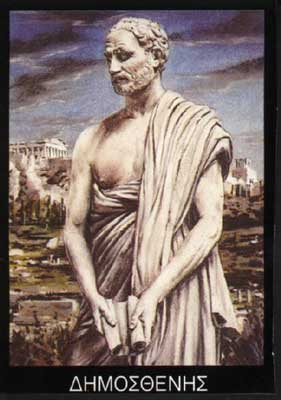|
|
He achieves an astonishing intensity, variety, and freshness of emotional expression. He never lets his audience anticipate what he will say next. No one creates periodic sentences longer or more complex, or so skillfully suspends the conclusion of a thought. No one has a better instinct for when to vary periodic structure with simpler sentences, or when to break off with a single word. No one better handles the thrust and parry of rhetorical questions and answers, sarcastic asides to and about his opponent, and sudden exclamations. No one can shift his tone so swiftly or with such effect. From a Lecture, Greek Prose Style (http://web.gc.cuny.edu/dept/class/gk701.htm)
Demosthenes Statue from Polyeuktos from Athens, c. 280 BC. Roman copy of the bronze original, Ny Carlsberg Glyptothek Copenhagen.
O Demosthenes if you had power like your intellect then the Macedonian Ares would not rule the Greeks! Inscription of a Demosthenes sculpture From Plutarch's "Lives of Illustrious Men." Another time, we are told, when his speeches had been ill-received, and he was going home with his head covered, and in the greatest distress, Satyrus, the player, who was an acquaintance of his, followed and went in with him. Demosthenes lamented to him, "That though he was the most laborious of all the orators, and had almost sacrificed his health to that application, yet he could gain no favour with the people; but drunken seamen and other unlettered persons were heard, and kept the rostrum, while he was entirely disregarded." "You say true," answered Satyrus, "but I will soon provide a remedy, if you will repeat to me some speech in Euripides or Sophocles." When Demosthenes had done, Satyrus pronounced the same speech; and he did it with such propriety of action, and so much in character, that it appeared to the orator quite a different passage. He now understood so well how much grace and dignity action adds to the best oration that he thought it a small matter to premeditate and compose, though with the utmost care, if the pronunciation and propriety of gesture were not attended to. Upon this he built himself a subterraneous study which remained to our times. Thither he repaired every day to form his action and exercise his voice; and he would often stay there for two or three months together, shaving one side of his head, that, if he should happen to be ever so desirous of going abroad, the shame of appearing in that condition might keep him in.
- |


